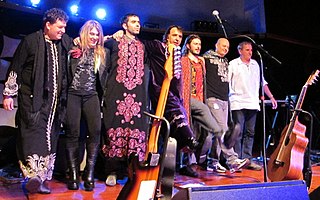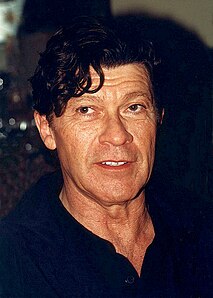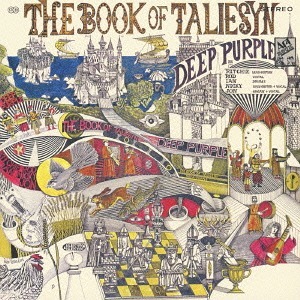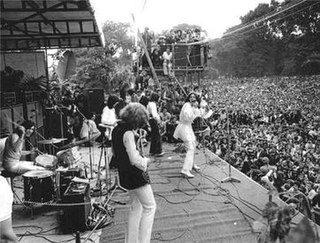
The Beatles were an English rock band formed in Liverpool in 1960. The group, whose best-known line-up comprised John Lennon, Paul McCartney, George Harrison and Ringo Starr, are regarded as the most influential band of all time. They were integral to the development of 1960s counterculture and popular music's recognition as an art form. Rooted in skiffle, beat and 1950s rock and roll, their sound incorporated elements of classical music and traditional pop in innovative ways; the band later explored music styles ranging from ballads and Indian music to psychedelia and hard rock. As pioneers in recording, songwriting and artistic presentation, the Beatles revolutionised many aspects of the music industry and were often publicised as leaders of the era's youth and sociocultural movements.

The Residents are an American art collective best known for their avant-garde music and multimedia works. Since their first official release, Meet the Residents (1974), the group has released over sixty albums, numerous music videos and short films, three CD-ROM projects, and ten DVDs. They have undertaken seven major world tours and scored multiple films. Pioneers in exploring the potential of CD-ROM and similar technologies, the Residents have won several awards for their multimedia projects. Ralph Records, a record label focusing on avant-garde music, was started by the band in 1972.

The Who are an English rock band formed in London in 1964. Their classic lineup consisted of lead singer Roger Daltrey, guitarist and singer Pete Townshend, bass guitarist and singer John Entwistle, and drummer Keith Moon. They are considered one of the most influential rock bands of the 20th century and have sold over 100 million records worldwide.
Progressive rock is a broad genre of rock music that developed in the United Kingdom and United States throughout the mid- to late 1960s. Initially termed "progressive pop", the style was an outgrowth of psychedelic bands who abandoned standard pop traditions in favour of instrumentation and compositional techniques more frequently associated with jazz, folk, or classical music. Additional elements contributed to its "progressive" label: lyrics were more poetic, technology was harnessed for new sounds, music approached the condition of "art", and the studio, rather than the stage, became the focus of musical activity, which often involved creating music for listening rather than dancing.

John Robert "Joe" Cocker was an English singer known for his gritty voice, spasmodic body movement in performance, and distinctive versions of popular songs of varying genres.

The Moody Blues are a rock band formed in Birmingham, England, in 1964, initially consisting of keyboardist Mike Pinder, multi-instrumentalist Ray Thomas, guitarist Denny Laine, drummer Graeme Edge, and bassist Clint Warwick. The group came to prominence playing rhythm and blues music. They made some changes in musicians but settled on a line-up of Pinder, Thomas, Edge, guitarist Justin Hayward, and bassist John Lodge, who stayed together for most of the band's "classic era" into the early 1970s.

Slade are an English rock band formed in Wolverhampton in 1966. They rose to prominence during the glam rock era in the early 1970s, achieving 17 consecutive top 20 hits and six number ones on the UK Singles Chart. The British Hit Singles & Albums names them the most successful British group of the 1970s based on sales of singles. They were the first act to have three singles enter the charts at number one; all six of the band's chart-toppers were penned by Noddy Holder and Jim Lea. As of 2006, total UK sales stand at 6,520,171, and their best-selling single, "Merry Xmas Everybody", has sold in excess of one million copies. According to the 1999 BBC documentary It's Slade, the band have sold over 50 million records worldwide.

Os Mutantes are an influential Brazilian rock band that were linked with the Tropicália movement, a dissident musical movement during the Brazilian dictatorship of the late 1960s. They released their acclaimed self-titled debut album in 1968.

David Noel Redding was an English rock musician, best known as the bass player for the Jimi Hendrix Experience and guitarist/singer for Fat Mattress.

Jaime Royal "Robbie" Robertson, OC, is a Canadian musician, songwriter, film composer, producer, actor, and author. Robertson is best known for his work as lead guitarist and songwriter for The Band, and for his career as a solo recording artist.

The Pretty Things were an English rock band, formed in September 1963 in Sidcup, Kent. They took their name from Willie Dixon's 1955 song "Pretty Thing". A pure rhythm and blues band in their early years, with several singles charting in the United Kingdom, they later embraced other genres such as psychedelic rock in the late 1960s, hard rock in the early 1970s and new wave in the early 1980s. Despite this, they never managed to recapture the same level of commercial success of their early releases.

Mountain was an American hard rock band that formed on Long Island, New York in 1969. Originally comprising vocalist and guitarist Leslie West, bassist and vocalist Felix Pappalardi, keyboardist Steve Knight and drummer N. D. Smart, the band broke up in 1972 and has reunited frequently since 1973. Best known for their cowbell-tinged song "Mississippi Queen", as well as the heavily sampled song "Long Red" and their performance at the Woodstock Festival in 1969, Mountain is one of many bands to be commonly credited as having influenced the development of heavy metal music in the 1970s. The group's musical style primarily consisted of hard rock, blues rock and heavy metal.

The Monterey International Pop Music Festival was a three-day concert event held June 16 to 18, 1967 at the Monterey County Fairgrounds in Monterey, California. The festival is remembered for the first major American appearances by the Jimi Hendrix Experience, the Who and Ravi Shankar, the first large-scale public performance of Janis Joplin and the introduction of Otis Redding to a mass American audience.

Kecak, known in Indonesian as tari kecak, is a form of Balinese hindu dance and music drama that was developed in the 1930s in Bali, Indonesia. Since its creation, it has been performed primarily by men, with the first women's kecak group having started in 2006. The dance is based on the story of the Ramayana and is traditionally performed in temples and villages across Bali.

The Mothers of Invention were an American rock band from California. Formed in 1964, their work is marked by the use of sonic experimentation, innovative album art, and elaborate live shows.

The Book of Taliesyn is the second studio album by the English rock band Deep Purple, recorded only three months after Shades of Deep Purple and released by Tetragrammaton Records in October 1968, just before their first US tour. The name for the album was taken from the 14th-century Book of Taliesin.

The Plastic People of the Universe (PPU) is a Czech rock band from Prague. It was the foremost representative of Prague's underground culture (1968–1989), which had gone against the grain of Czechoslovakia's Communist regime. Due to their non-conformism, members of the band often suffered serious repercussions such as arrests. The group continues to perform despite the death of its founder, main composer and bassist, Milan "Mejla" Hlavsa in 2001.

The Kinks are an English rock band formed in Muswell Hill, north London, in 1964 by brothers Ray and Dave Davies. They are regarded as one of the most influential rock bands of the 1960s. The band emerged during the height of British rhythm and blues and Merseybeat, and were briefly part of the British Invasion of the United States until their touring ban in 1965. Their third single, the Ray Davies-penned "You Really Got Me", became an international hit, topping the charts in the United Kingdom and reaching the Top 10 in the United States. Their music was influenced by a wide range of genres, including American R&B and rock and roll initially, and later adopting British music hall, folk, and country. They gained a reputation for reflecting English culture and lifestyle, fuelled by Ray Davies' wittily observational writing style.

The Velvet Underground was an American rock band formed in New York City in 1964 by singer/guitarist Lou Reed, multi-instrumentalist John Cale, guitarist Sterling Morrison, and drummer Angus MacLise. MacLise was replaced by Moe Tucker in 1965, who played on most of the band's recordings. The band performed under a number of names before settling on The Velvet Underground in 1965. Pop artist Andy Warhol became their manager in 1966, and they served as the house band at Warhol's art collective known as "the Factory" and Warhol's traveling multimedia show, the Exploding Plastic Inevitable, from 1966 to 1967. Their debut album, The Velvet Underground & Nico, was released in 1967 to critical indifference and poor sales but has since become critically acclaimed; in 2003, Rolling Stone called it the "most prophetic rock album ever made."

The Stones in the Park was a free outdoor festival held in Hyde Park on 5 July 1969, headlined by The Rolling Stones and featuring Third Ear Band, King Crimson, Screw, Alexis Korner's New Church, Family and the Battered Ornaments, in front of an estimated audience between 250,000–500,000 spectators.


















